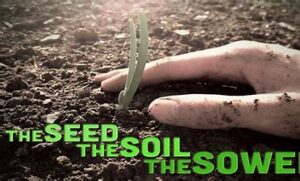 Jesus must have been a visual learner – His words are so visually clear: “If a seed is planted into the ground and it does not die, it remains a seed. But if it dies, it produces many seeds and seedlings and those seeds and their seedlings produce much fruit.”
Jesus must have been a visual learner – His words are so visually clear: “If a seed is planted into the ground and it does not die, it remains a seed. But if it dies, it produces many seeds and seedlings and those seeds and their seedlings produce much fruit.”
We may think of seeds as a sign of new life, but the process really begins with the seed dying. Could it be that the key to life is death? Could it be that the key to living is dying? Could it be that dying is important to living? Listen once more to Jesus’ words: “Unless a seed dies, it remains a single seed, but if it dies, it produces many seeds and therefore much fruit.”
So, what happens when a seed dies?” Inside every seed is an embryo, and in that embryo is a root which goes down into the ground; and a shoot that rises above. Every embryo has a root and a shoot; and inside (this is really a miracle), an “on” and “off” switch.
When a dormant seed is immersed in a growing medium, in optimal conditions, the switch goes “ON.” The seed takes in water, and miraculously begins to expand. I suspect you’ve seen it happen when as a youngster you put a lima bean in a wet paper towel inside a see-through container. Anxiously, you watched to see whose seed would be the first to show signs of the miracle of growth. That is what Jesus was describing: “Unless a seed dies, it remains a single seed; but if it dies, it produces many seeds and then much fruit.”
Isn’t this the story with us and our good intentions? Some behavior must die, it must give way to a new “me.” When conditions are just right, the switch goes ON, protective fear breaks loose, and we begin to practice a new way of conducting ourselves. Like new seeds, without greenhouse coaxing, it takes 40 days to acquire a new habit. Mmmm … Did that figure into the reason there are 40 days in Lent?
A similar miracle of nature happens with salmon. Salmon make their way ever so slowly along the water bottom, their noses worn white from abrasions by rocks and pebbles. They travel hundreds of miles to their spawning fields. My father, a career Coast Guard man, spent months at a time on patrol along the U.S. Pacific coast protecting spawning salmon from poachers.
Salmons’ instinct bring them back to the place of their birth. After spending a year or two or three out in the ocean and swimming back up to the stream of their birth, the salmon are preparing to die. At the end of their long laborious journey, they dig a hole and lay their eggs. And, they die. And out of those eggs comes new life. For it is ONLY through dying that there is new life among the salmon. And so there is a parallel is there not, between the seed and the salmon? For both, death is necessary for life. In dying, new life springs forth.
And, therein is our Lenten lesson – it is in dying that we begin living. In the words of St. Francis of Assisi’s famous peace prayer; “It is in giving that we receive; it is in dying that we are born again.”
How is your Lenten “dying” going? On Holy Saturday evening, at the Easter Vigil service, as we ignite the new fire we will watch our Lenten resolutions go up in smoke. What will have died in us? Will self-will have resigned its place to deference? Will compulsive appetites have given way to mortification? Will my prompt to choices be less “what’s good for me” and be more “what’s good for the community?” Will infidelity have yielded to loyalty? Will self-pleasure have conceded to service to others? Will the needs of others more likely motivate my actions? Will I finally have relinquished a life-long destructive habit? Will I have surrendered my quick tongue to gentleness of tone of voice? What will have died? What will spring up in its place?
Jesus summed it up for us: “Whoever will find life must lose it, but whoever loses life will find it. If anyone would serve me, they must follow me.” Where? You must follow Me in death to self. The seed must first die. Only then will Jesus “Easter” in us!
~Reflection by Sister Roberta Bailey, OSB
Happy St. Patrick’s Day (March 17), St. Joseph (March 19) and St. Benedict (March 21)
Rejoice with me when on March 23 as I mark 65 years since I pronounced my vows as a Benedictine Sisters of Florida.



